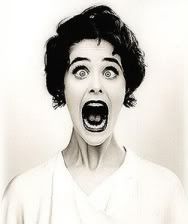 The always insightful (and equally delightful) Sarah Langan (who's not pictured at left!) has a great essay up at The Humanities Review called "Why I Write Horror." If you're not familiar with Sarah's work, first, hang your head in shame, and then make a beeline for the nearest bookstore and pick up copies of The Keeper and The Missing. If you enjoy well-crafted, literary horror that insinuates rather than clobbers, these are two books you're not likely to soon forget.
The always insightful (and equally delightful) Sarah Langan (who's not pictured at left!) has a great essay up at The Humanities Review called "Why I Write Horror." If you're not familiar with Sarah's work, first, hang your head in shame, and then make a beeline for the nearest bookstore and pick up copies of The Keeper and The Missing. If you enjoy well-crafted, literary horror that insinuates rather than clobbers, these are two books you're not likely to soon forget. In the essay, Sarah addresses the reaction she often receives - and one most horror writers (at least the ones brave enough to still call themselves such) can relate to - from family, friends, and associates when she drops the H-word in answer to the "So, dear, what is it that you write?" question. She goes on to explain her own motivation in writing horror, and in doing so, she draws lines between various genres and what each asks of its readers. One passage that I particularly liked:
"All genres have their intended effects. In mysteries, readers are asked to analyze. They solve puzzles. In science fiction, they imagine new, and occasionally better, worlds. But in horror, readers are asked to feel. That is why, when they put the book on the nightstand and turn out the light, they imagine that the creaking floor might actually be the ghost from the novel, bursting through the fictitious world, and into their bedrooms. They are the Gepettos of the novels they read, and in feeling, they give Pinocchio flesh."
Sarah hypothesizes that the popularity of the horror genre is cyclical and in direct proportion to the state of the world at any given time, asserting that it's no small coincidence that in the late 70's when the world was terrified by a hostage crisis and fearful of an energy shortage that authors and filmmakers with last names like King, Romero, Cronenberg, and Blatty became staples of the pop culture vernacular. Flash forward a quarter of a century later, Langan maintains, and the genre is again surfboarding across a wave of popularity as war rages without foreseeable end, nature seemingly sends message after (largely unheeded) message of environmental instability, and the country is still licking its collective wounds after an unfathomable terrorist attack in what the world thought was one of the unlikeliest places. Factor in a country poised to enter unchartered social territory with a viable African-American presidential candidate, an epidemic of home foreclosures and a suddenly unaffordable American dream, and global paranoia as neighboring countries stockpile weapons of mass destruction, and you've got the makings of a perfect storm ripe for genre consumption.
Sarah makes the case that society needs horror to channel and express the emotions bottled up inside us. It's a way to let off steam, burn off excess emotion like physical exercise burns of excess calories. Because what happens to excess calories? They gather and settle, turning into fat that weighs us down. It's the same thing with excess emotion - it festers, grows, and settles with no outlet. Emotional flab. It weighs us down, becomes overstuffed baggage we can neither move nor close after awhile.
And while some may dismiss horror (and other genre fiction for that matter) as nothing more than pure escapism, I'd caution those quick to trivialize or reject its therapeutic benefits. And I'd counter that with a big "what if." What if society has no outlet for its collective fears? These emotions can only be contained for so long. What's the risk to individual and the collective if fear and stress and frustration have nowhere to go? The human capacity to absorb stress isn't limitless. It can be stretched and strained, but, like balloons, there is a breaking point. There's only so much air a balloon can take; similarly, there's only so much emotional strain a human being can absorb.
Balloons break. But people?
Therein may lie the greatest thing to fear of all.







No comments:
Post a Comment